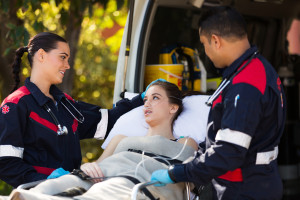 When someone is sick or injured it is important to quickly recognize the signs of an emergency. Individuals are often faced with the difficult situation of determining whether an injury or medical condition is a true emergency. A delay in obtaining appropriate medical evaluation and care could mean the difference between life and death. It could also result in a worse outcome for the individual such as paralysis or other potentially life-long disability. When unsure if an emergency is critical, it is always a good idea to call 911. Ambulance drivers will know the quickest route to the closest hospital and are staffed with trained emergency medical technicians to treat patients while they are being transported to an emergency room.
When someone is sick or injured it is important to quickly recognize the signs of an emergency. Individuals are often faced with the difficult situation of determining whether an injury or medical condition is a true emergency. A delay in obtaining appropriate medical evaluation and care could mean the difference between life and death. It could also result in a worse outcome for the individual such as paralysis or other potentially life-long disability. When unsure if an emergency is critical, it is always a good idea to call 911. Ambulance drivers will know the quickest route to the closest hospital and are staffed with trained emergency medical technicians to treat patients while they are being transported to an emergency room.
If you are experiencing or witness someone experiencing any of the following signs of an impending emergency you should call 911 immediately:
• Trauma – Serious head injury, severe burns, deep or large wounds, continuous bleeding that doesn’t stop, serious injuries to neck or spine, especially if there is a loss of feeling or inability to move, broken or fractured bones.
• Signs of a stroke – Difficulty speaking, sudden confusion, loss of balance or coordination, sudden and serious headache or weakness or numbness of the face, arm or leg; occurring on just one side of the body.
• Acute chest pain – Chest pain could be a sign of a heart attack, especially when accompanied by sweating, nausea, dizziness or shortness of breath.
• Seizures – Seizure that lasts more than 3 minutes or accompanied with breathing problems.
• Respiratory emergencies – Severe shortness of breath or difficulty breathing, choking, drowning, strangulation, coughing up blood or severe asthma attack.
• Serious gastrointestinal conditions – Persistent or sudden abdominal pain, severe or persistent vomiting, vomiting up blood or ingestion of poison.
• Sudden change in mental status – Passing out, confusion, extreme lethargy or unresponsiveness, unusual behavior, sudden dizziness or fainting.
• Pneumonia – Flu-like symptoms that improve but then return with a fever and worse cough.
• Anaphylaxis – Severe allergic reactions need to be treated right away. Call 911 first and then look to see if the person has an EpiPen (Epinephrine) which can reverse the symptoms within minutes and save their life.
• Heat Stroke – Hot skin that is red, mottled or blue that is accompanied by dizziness, confusion or weakness
Emergency warning signs for children and infants
If your child or infant is experiencing any of the following symptoms you should seek immediate medical attention.
• Bluish skin color
• Refuses to drink fluids
• Refuses to eat anything
• Fast or labored breathing
• Not waking up or interacting
• High fever with a rash
• Flu-like symptoms that improve but then return with a fever and worse cough
• Irritability and not wanting to be held
• Crying but without producing any tears
In a life-threatening situation, every second counts. It is important to have a plan ahead of time and know where the closest hospitals are to your home, work and children’s schools. When researching hospitals check with your health insurance company to see what will be covered. Always keep your insurance and medical information on you. It is also a good idea to save the hospital’s phone number in your phone as well as your primary care physician’s number.
OakBend Medical Center is proud to offer the only No Wait Hospital Emergency Room in the entire Greater Houston Area. With three convenient locations, Jackson Street Hospital Emergency Center, Williams Way Hospital Emergency Center and Grand Parkway Emergency Center you can get the highest quality care when you need it most. All three locations are Stroke and Emergency Medicine Certified. Their Jackson Street Hospital Campus also has the most advanced Trauma Center in all of Fort Bend County. For more information please call 281-341-3000 today.
Types of Emergencies
OakBend Medical Center © 2023 All rights reserved | Site Development by: IBI Marketing
